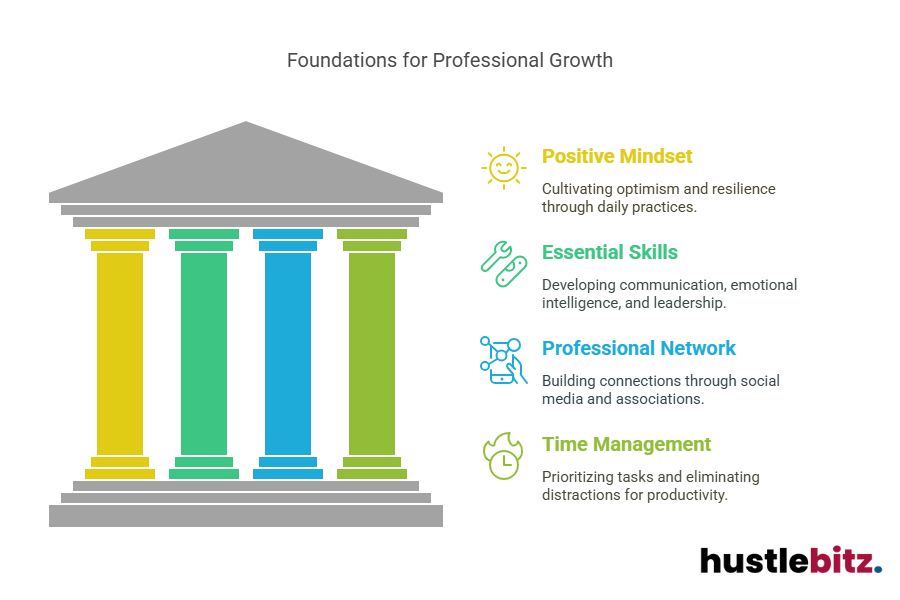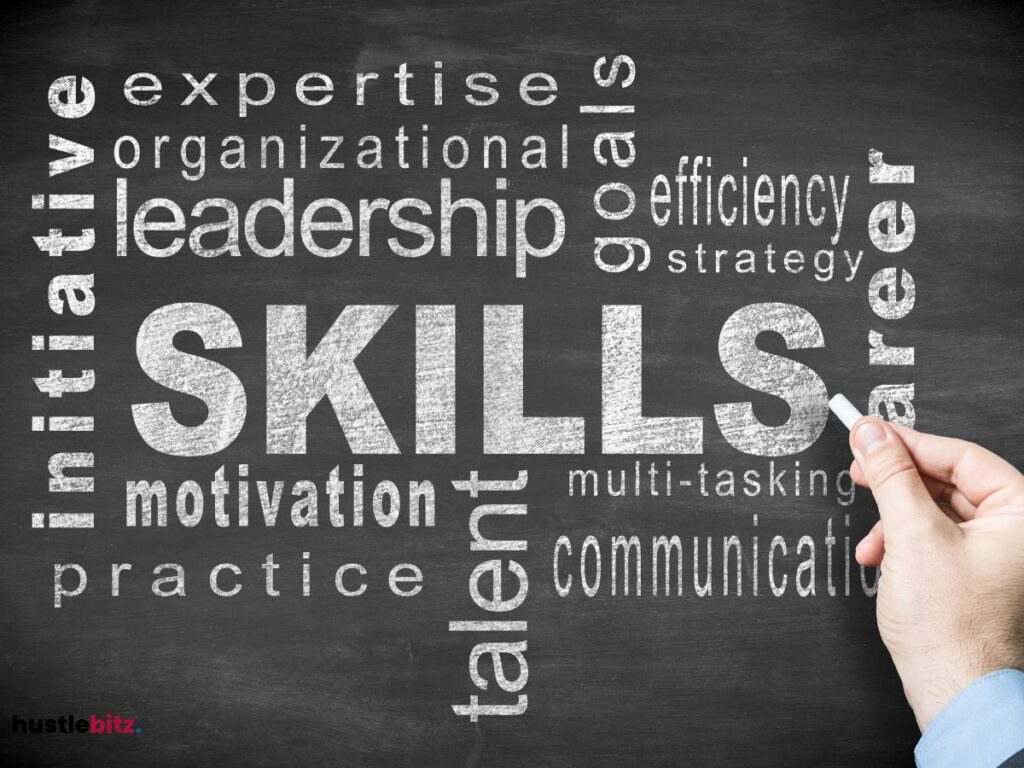To excel and thrive in your career, start by cultivating a positive mindset. This fosters resilience and helps you view challenges as opportunities. Develop essential skills such as effective communication and emotional intelligence to enhance your adaptability. Building a robust professional network can lead to valuable opportunities and resources. Prioritize tasks and eliminate distractions to improve your time management. Embrace feedback to foster continuous improvement, and consider finding a mentor to gain insights and guidance. These strategies will position you as a valuable contributor in your field and pave the way for further growth opportunities. Discover additional tips for success ahead.
Key Takeaways
- Cultivate a positive mindset by practicing daily affirmations, gratitude, and visualization techniques to enhance resilience and motivation.
- Develop essential skills like effective communication, emotional intelligence, and leadership qualities to increase adaptability and value in the workplace.
- Build a robust professional network through social media, participation in associations, and informational interviews to unlock new opportunities.
- Enhance time management by prioritizing tasks, setting deadlines, eliminating distractions, and utilizing tools to stay organized and productive.
- Find a mentor to gain insights, receive constructive feedback, and expand your network for career navigation and growth.

Cultivate a Positive Mindset

Cultivating a positive mindset is essential for career success, as it not only enhances your resilience in the face of challenges but also fosters productive relationships with colleagues and clients. A growth mindset, which embraces learning and improvement, allows professionals to view obstacles as opportunities for development. By integrating positive affirmations into daily routines, individuals can reinforce their self-belief and motivation, which is critical for resilience building.
Incorporating gratitude practices into your life can shift focus from setbacks to appreciation, promoting a more optimistic outlook. Effective stress management techniques, such as mindfulness training, can further reduce anxiety and improve focus. Visualization techniques, where one imagines achieving their goals, help clarify objectives and foster a proactive approach to goal setting.
Self-reflection exercises are invaluable for enhancing emotional intelligence, as they encourage individuals to assess their thoughts, feelings, and behaviors. This practice can lead to greater self-awareness and improved interpersonal skills, enabling better communication and collaboration with others.
Ultimately, cultivating a positive mindset is a continuous process that requires dedication and practice. By adopting these strategies, professionals not only enhance their career prospects but also contribute to a more supportive and innovative workplace culture. Embracing this mindset allows individuals to navigate their careers with greater confidence and purpose, leading to sustained success and fulfillment.
Develop Essential Skills

Building a diverse set of essential skills is crucial for advancing in today’s competitive job market, as it enhances your adaptability and value to potential employers. A well-rounded skill set not only prepares you for various challenges but also positions you as a versatile candidate who can contribute significantly to organizational success.
Effective communication skills are foundational, enabling you to articulate ideas clearly and foster collaboration. Coupled with strong critical thinking and problem-solving abilities, these skills empower you to analyze situations, make informed decisions, and devise innovative solutions.
Additionally, emotional intelligence is vital for understanding and managing interpersonal dynamics, which is essential in any workplace. Adaptability skills allow you to thrive in rapidly changing environments, while negotiation techniques enable you to reach mutually beneficial agreements.
Developing leadership qualities is equally important, as they inspire and guide teams toward shared goals. Technical proficiency in relevant tools and software not only enhances your productivity but also demonstrates your commitment to staying current in your field.
Creativity enhancement encourages out-of-the-box thinking, driving innovation and improvement. Furthermore, mastering project management ensures that you can effectively oversee initiatives from inception to completion, balancing time, resources, and stakeholder expectations.
Build a Professional Network

Establishing a robust professional network is essential for career growth, as it opens doors to opportunities, resources, and valuable connections within your industry. Effective networking strategies can significantly enhance your career trajectory by fostering relationships that lead to mentorship opportunities and collaborative projects.
To begin building your network, leverage social media platforms such as LinkedIn to create online connections with industry professionals. These platforms allow you to engage with others in your field, share insights, and stay updated on industry trends. Participating in professional associations can also provide access to industry events, where you can meet peers and leaders face-to-face, facilitating meaningful relationship building.
Informational interviews are another effective tool for expanding your network. By reaching out to professionals whose careers you admire, you can gain invaluable insights and advice, while establishing connections that may prove beneficial in the future. However, it’s crucial to adhere to networking etiquette—approach these individuals with respect for their time and express genuine interest in their experiences.
As you interact with your network, focus on developing collaboration skills that foster mutually beneficial relationships. Remember, networking isn’t just about what you can gain; it’s about how you can contribute to others’ success as well. By nurturing these connections over time, you will cultivate a strong professional network that supports your career ambitions and opens doors to new opportunities.
Enhance Time Management

Effective time management is crucial for maximizing productivity and achieving career goals in today’s fast-paced work environment. To enhance your time management skills, begin by prioritizing tasks based on urgency and importance. This allows you to focus on what truly matters and allocate time effectively. Setting deadlines for each task can also create a sense of urgency, helping to maintain momentum.
Eliminating distractions is essential in maintaining focus. Identify common interruptions and take proactive steps to minimize them, such as turning off non-essential notifications or creating a designated workspace. Additionally, utilizing tools like calendars, task management apps, or time-tracking software can streamline your workflow and keep you organized.
Delegating responsibilities can further enhance your time management. By recognizing tasks that can be assigned to colleagues, you free up time to concentrate on high-priority projects. Establishing routines helps to create a structured work environment, allowing you to predict and manage your time better.
Breaking projects into smaller, manageable tasks can reduce overwhelm and aid in progress tracking. Schedule breaks to recharge, as this can enhance overall productivity and creativity. Regularly reviewing progress on your tasks ensures that you stay on track and allows for adjustments when necessary.
Lastly, make it a habit to reflect regularly on your time management strategies. Identifying what works and what doesn’t can lead to continuous improvement, ultimately enhancing your effectiveness in your career. By implementing these practices, you will position yourself to excel and thrive in your professional journey.
Embrace Feedback and Adapt

Regularly embracing feedback from colleagues and supervisors is essential for professional growth and adaptation in a dynamic work environment. Constructive criticism serves as a valuable tool for enhancing individual performance and fostering a culture of continuous improvement. Establishing effective feedback loops can facilitate open communication, allowing team members to share insights and experiences that contribute to learning agility.
Engaging in adaptability training helps professionals navigate the challenges of an ever-evolving workplace. By incorporating open-mindedness practices, individuals can cultivate a willingness to consider diverse perspectives and new ideas. This approach not only enhances problem-solving abilities but also promotes resilience building, essential for overcoming obstacles and setbacks.
Implementing self-reflection techniques after receiving feedback enables individuals to assess their strengths and areas for improvement. Performance reviews can be daunting; however, viewing them as opportunities for growth rather than assessments of failure can significantly impact career growth. By actively seeking feedback and integrating it into daily practices, professionals can better align their efforts with organizational goals.
Ultimately, embracing feedback and adapting accordingly fosters a mindset of continuous improvement. This proactive approach not only enhances individual capabilities but also strengthens team dynamics and overall organizational performance. By prioritizing feedback and adaptability, professionals can position themselves as valuable contributors to their workplaces, driving both personal and collective success.
Enhance Time Management
Mastering time management is crucial for professionals seeking to maximize productivity and achieve their career goals.
To enhance your time management skills, start by prioritizing tasks based on their urgency and importance. This will help you focus on what truly matters, ensuring that critical deadlines are met. Setting deadlines for each task creates a sense of urgency that can motivate you to complete them efficiently.
Utilizing tools such as calendars, to-do lists, or project management software can significantly streamline your workflow. Additionally, don’t forget to plan breaks to recharge; short intervals of rest can improve concentration and reduce fatigue. It’s equally important to eliminate distractions, which can derail your focus and extend the time spent on tasks.
Track your progress regularly to assess how well you are managing your time. This can help identify areas for improvement and allow you to adjust your strategies accordingly. Establishing routines fosters a predictable workflow, making it easier to stay disciplined. When possible, delegate responsibilities to others; this not only eases your workload but also empowers your team.
Regularly review your goals to ensure they align with your time management strategy. Lastly, effective time management can significantly help manage stress, promoting a healthier work-life balance.
Find a Mentor
Finding a mentor can significantly enhance your professional development, as their guidance and experience can provide invaluable insights into navigating your career path. A successful mentor relationship is built on mutual respect and trust, which are fundamental mentor qualities. When considering finding mentors, look for individuals who have experience in your field, possess effective communication skills, and demonstrate a commitment to your growth.
Mentor relationships can vary widely in mentoring styles; some may adopt a more hands-on approach, while others may serve as sounding boards for your ideas. Establishing clear expectations from the onset can facilitate this process. Mentorship programs can also be valuable resources, connecting you with seasoned professionals who are willing to share their knowledge.
The benefits of having a mentor are profound. They can help you set goals, identify your strengths and weaknesses, and provide constructive feedback mechanisms that foster your growth. Regular check-ins can solidify the relationship, ensuring that both parties are aligned in their objectives.
Building trust is essential, as it creates a safe environment for open dialogue and honest feedback. As you engage with your mentor, be receptive to their insights and willing to adapt your approach based on their guidance. Ultimately, finding a mentor not only accelerates your career development but also enriches your professional network, paving the way for future opportunities.
Final Thoughts
Excelling and thriving in your career requires a combination of a positive mindset, essential skill development, effective time management, and embracing feedback. By building a strong professional network and finding a mentor, you can gain valuable insights that propel your career forward. Continuously investing in your personal growth and remaining adaptable will allow you to navigate challenges confidently and achieve long-term success. Ultimately, with a proactive approach to your career, you’ll be better equipped to seize new opportunities and foster a fulfilling professional journey.




